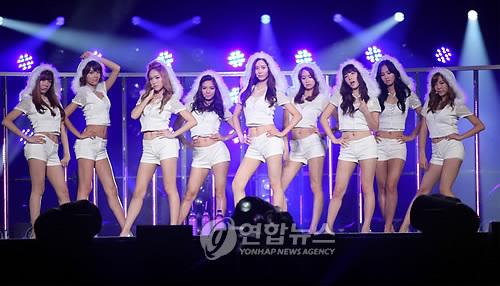But when the curtains went down, the fans screaming and jumping were mostly young women and teenagers, some in school uniforms.
"We never had middle school students in our fandom," Koo Ha-ra, 19, of the five-member idol group, said in a recent joint interview with several other K-pop idols. "They came to our fan meetings in school uniforms and screamed, 'Sister, I love you!' Suddenly, we had a lot of little sisters in Japan."
With the driving force of the Korean Wave changing from television dramas to pop music, idol groups are making fast inroads into Asian entertainment markets, sweeping the music charts and building multinational fanbases. The K-pop boom is diversifying the consumer demographic of the Korean Wave from female drama viewers in their 40s to 50s to a new generation of tech-savvy music buyers. What was a cultural phenomenon has become explosive in industrial value with massive financial potential, insiders say.
Girls' Generation, a nine-member girl group, soared to the second spot on the Japanese weekly Oricon charts less than a week after their second album, "Gee," was released in Tokyo in late October. Boy groups are more dominant in Chinese-speaking regions, with Super Junior, SHINee, CN Blue and Beast topping music charts in Taiwan, Hong Kong and Singapore. Entertainment agencies in Thailand and China are making visits to Korean talent houses in attempts to benchmark their successes.
"Considering that the majority of culture consumers are teenagers and those in their 20s and 30s, the K-pop boom with younger Asian generations is an encouraging sign for us," said Kim Young-min, chief executive officer of SM Entertainment, a Seoul-based star agency that has produced Girls' Generation, TVXQ and Super Junior, among others.
With the overseas success of its idol groups, SM's outbound sales jumped to 28 billion won (US$25 million) during the first half of this year, a notable leap from 19 billion won garnered during the entire year of 2009, Kim said.
 |
K-pop idols leading the Korean Wave in Asia -- Onew of SHINee, Kim Hyun-ah of 4minute, Koo Ha-ra of Kara, Narsha of Brown Eyed Girls and Wooyoung of 2PM (from L to R) -- pose for a photograph during a joint interview. (Yonhap) |
The Korean Wave originates from the melodrama series "Winter Sonata," which became a huge hit across Asia in 2003 and 2004. Mature female fans from Japan and Southeast Asia would travel to South Korea just to tour shooting locations or swarming airports to greet actors arriving in their countries.
Music experts say it is now K-pop that is leading the wave, on the back of strategic overseas marketing and the rise of the digital media and social networking services.
Boy group 2PM, immensely popular at home and in Southeast Asian countries, never expected their fanbase would go beyond Asia, but their latest music video of "I'll Be Back" got soaring number of hits on YouTube.
"It was really funny," Wooyoung, a 2PM member, said during the joint interview. "We were surprised to see people in Europe and the U.S. watch our video and post their views."
For 2PM, like many K-pop stars, singing on stage or doing variety shows is only a fraction of their hectic schedule. Off the stage, they get singing and dance lessons, work out regularly and learn Chinese and Japanese from private tutors.
"Fans in Singapore, China, Taiwan and Thailand sing our songs in Korean. Their support gives me courage and energy to go on," Wooyoung said.
The determination of the idol stars and their polished looks, combined with successful marketing, can take credit for the K-pop boom, music industry experts say.
"Korean idols have a strong will to survive in the fiercely competitive entertainment world, so they never compromise on their singing and dancing," said Osamu Takahashi, editor in chief of Japanese monthly Music Magazine.
Yasu Akimoto, chief producer of a Japanese hit girl group, AKB4B, agreed. "Korean girl groups' singing and dancing skills are overwhelmingly good."
 |
Even before their album was released in Japan, Girls' Generation drew nearly 30,000 fans in their debut showcase at Ariake Colosseum in Tokyo in August. (Yonhap) |
Also, Korean talent agencies tailor the youngsters from the day they sign on, grooming them for the broader Asian market. Star aspirants usually undergo several years of musical training and language lessons before they are given a chance to debut.
"From 10 years ago, Korean agencies, anxious about their small-scale domestic market, began to see Asia as a single market and prepared to produce 'de-Koreanized' content," said Hong Seung-sung, chief of Cube Entertainment, which has produced 4Minute and Beast. "Their efforts on discovering talent, systematic training and strategic overseas marketing -- all are now paying off."

No comments:
Post a Comment